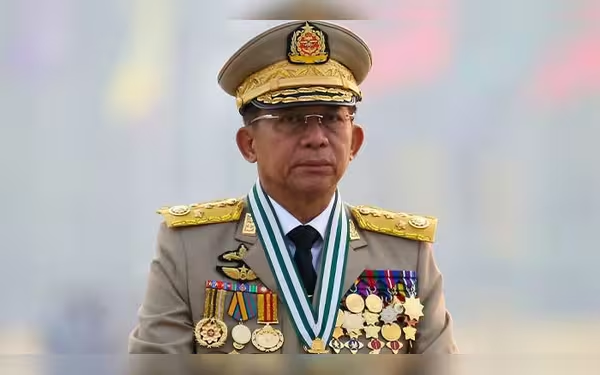Sunday, December 22, 2024 03:34 AM
ICC Seeks Arrest Warrant for Myanmar Junta Chief Min Aung Hlaing
- ICC requests arrest warrant for Min Aung Hlaing.
- First warrant against Myanmar official for Rohingya crimes.
- International community demands justice for Rohingya Muslims.
 Image Credits: thenews.com.pk
Image Credits: thenews.com.pkICC requests arrest warrant for Myanmar's Min Aung Hlaing over alleged crimes against Rohingya, marking a significant step towards justice.
The situation in Myanmar has been a topic of international concern for several years, particularly regarding the treatment of the Rohingya Muslim community. This ethnic group has faced severe persecution, leading to a humanitarian crisis that has displaced hundreds of thousands of people. The International Criminal Court (ICC) has been closely monitoring these events, and now, significant developments are unfolding.
On Wednesday, the ICC's chief prosecutor, Karim Khan, made a pivotal move by requesting an arrest warrant for Min Aung Hlaing, the chief of Myanmar's military junta. This request marks a historic moment as it is the first time an arrest warrant has been sought against a high-ranking official from Myanmar in relation to the alleged crimes against humanity committed against the Rohingya people. The charges include serious violations that have drawn widespread condemnation from human rights organizations and the international community.
The Rohingya Muslims have faced brutal treatment, including violence, displacement, and discrimination, which many experts and activists classify as ethnic cleansing. The ICC's action is seen as a crucial step towards accountability and justice for the victims of these atrocities. By pursuing legal action against Min Aung Hlaing, the ICC aims to send a strong message that such violations will not go unpunished.
As the world watches closely, the outcome of this request could have far-reaching implications. It may not only affect the political landscape in Myanmar but also influence how other nations approach human rights violations. The international community has a responsibility to support efforts that seek justice for the Rohingya and to hold those in power accountable for their actions.
The ICC's pursuit of an arrest warrant against Min Aung Hlaing is a significant development in the ongoing struggle for justice for the Rohingya people. It highlights the importance of international law in addressing human rights abuses and serves as a reminder that the fight for justice is far from over. As we continue to follow this story, it is essential to remain informed and advocate for the rights of those who have suffered injustices.













